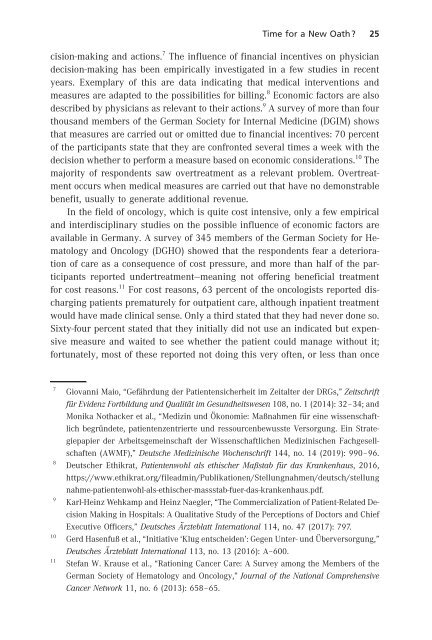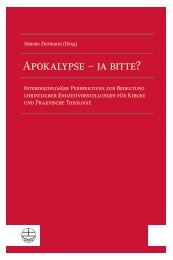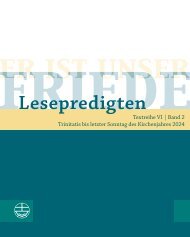Michael Welker | Eva Winkler | John Witte, Jr. | Stephen Pickard (Eds.): The Impact of Health Care (Leseprobe)
Pluralism has become the defining characteristic of many modern societies. Not only a plurality of individual and social claims and activities gain impacts on societal life. A creative pluralism of institutions and their norms profoundly shape our moral commitments and character – notably the family, the market, the media, and systems of law, religion, politics, research, education, health care, and defense. In the theoretical, empirical, and historical contributions to this volume, specialists on medicine, medical ethics, psychology, theology and health care discuss the many challenges that major transformations in their areas of expertise pose to the communication and orientation in late modern pluralistic societies. Contributors come from Germany, the USA and Australia.
Pluralism has become the defining characteristic of many modern societies. Not only a plurality of individual and social claims and activities gain impacts on societal life. A creative pluralism of institutions and their norms profoundly shape our moral commitments and character – notably the family, the market, the media, and systems of law, religion, politics, research, education, health care, and defense.
In the theoretical, empirical, and historical contributions to this volume, specialists on medicine, medical ethics, psychology, theology and health care discuss the many challenges that major transformations in their areas of expertise pose to the communication and orientation in late modern pluralistic societies. Contributors come from Germany, the USA and Australia.
Create successful ePaper yourself
Turn your PDF publications into a flip-book with our unique Google optimized e-Paper software.
Time for aNew Oath? 25<br />
cision-making and actions. 7 <strong>The</strong> influence <strong>of</strong> financial incentives on physician<br />
decision-making has been empirically investigated in afew studies in recent<br />
years. Exemplary <strong>of</strong>this are data indicating that medical interventions and<br />
measures are adapted to the possibilities for billing. 8 Economic factors are also<br />
describedbyphysicians as relevant to their actions. 9 Asurvey <strong>of</strong> more than four<br />
thousand members <strong>of</strong> the German Society for Internal Medicine (DGIM) shows<br />
that measures are carried out or omitted due to financial incentives: 70 percent<br />
<strong>of</strong> the participants state that they are confronted several times aweek with the<br />
decisionwhether to perform ameasure based on economic considerations. 10 <strong>The</strong><br />
majority <strong>of</strong> respondents saw overtreatment as arelevant problem. Overtreatment<br />
occurs when medical measures are carried out that have no demonstrable<br />
benefit, usually to generate additional revenue.<br />
In the field <strong>of</strong> oncology, which is quite cost intensive, only afew empirical<br />
and interdisciplinary studies on the possible influence <strong>of</strong> economic factors are<br />
available in Germany. Asurvey <strong>of</strong> 345 members <strong>of</strong> the German Society for Hematology<br />
and Oncology (DGHO) showed that the respondents fear adeterioration<br />
<strong>of</strong> care as aconsequence <strong>of</strong>cost pressure, and more than half <strong>of</strong> the participants<br />
reported undertreatment—meaning not <strong>of</strong>fering beneficial treatment<br />
for cost reasons. 11 For cost reasons, 63percent <strong>of</strong> the oncologists reported discharging<br />
patients prematurely for outpatient care, although inpatient treatment<br />
would havemadeclinical sense. Only athird stated that they had never done so.<br />
Sixty-four percent stated that they initially did not use an indicated but expensive<br />
measure and waited to see whether the patient could manage without it;<br />
fortunately, most <strong>of</strong> these reported not doing this very <strong>of</strong>ten, or less than once<br />
7<br />
8<br />
9<br />
10<br />
11<br />
Giovanni Maio, “Gefährdung der Patientensicherheit im Zeitalter der DRGs,” Zeitschrift<br />
für Evidenz Fortbildung und Qualität im Gesundheitswesen 108, no. 1(2014): 32–34; and<br />
Monika Nothacker et al., “Medizin und Ökonomie: Maßnahmen fu reine wissenschaftlich<br />
begru ndete, patientenzentrierte und ressourcenbewusste Versorgung. Ein Strategiepapier<br />
der Arbeitsgemeinschaft der Wissenschaftlichen Medizinischen Fachgesellschaften<br />
(AWMF),” Deutsche Medizinische Wochenschrift 144, no. 14 (2019): 990–96.<br />
Deutscher Ethikrat, Patientenwohl als ethischer Maßstab fu rdas Krankenhaus, 2016,<br />
https://www.ethikrat.org/fileadmin/Publikationen/Stellungnahmen/deutsch/stellung<br />
nahme-patientenwohl-als-ethischer-massstab-fuer-das-krankenhaus.pdf.<br />
Karl-Heinz Wehkamp and Heinz Naegler, “<strong>The</strong> Commercialization <strong>of</strong> Patient-Related Decision<br />
Making in Hospitals: AQualitative Study <strong>of</strong> the Perceptions <strong>of</strong> Doctors and Chief<br />
Executive Officers,” Deutsches Ärzteblatt International 114, no. 47 (2017): 797.<br />
Gerd Hasenfuß et al., “Initiative ‘Klug entscheiden’:Gegen Unter- und Überversorgung,”<br />
Deutsches Ärzteblatt International 113, no. 13 (2016): A–600.<br />
Stefan W. Krause et al., “Rationing Cancer <strong>Care</strong>: ASurvey among the Members <strong>of</strong> the<br />
German Society <strong>of</strong> Hematology and Oncology,” Journal <strong>of</strong> the National Comprehensive<br />
Cancer Network 11, no. 6(2013): 658–65.
















